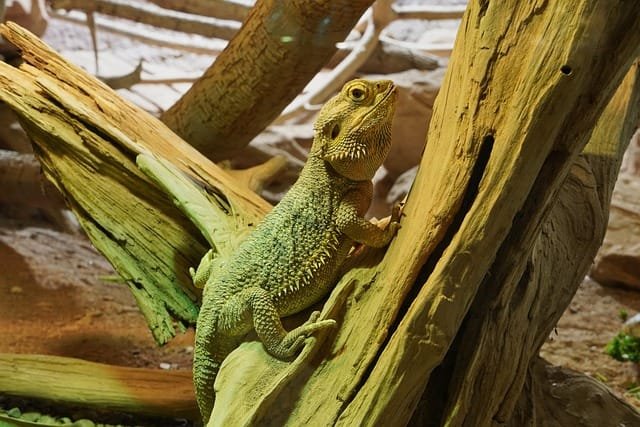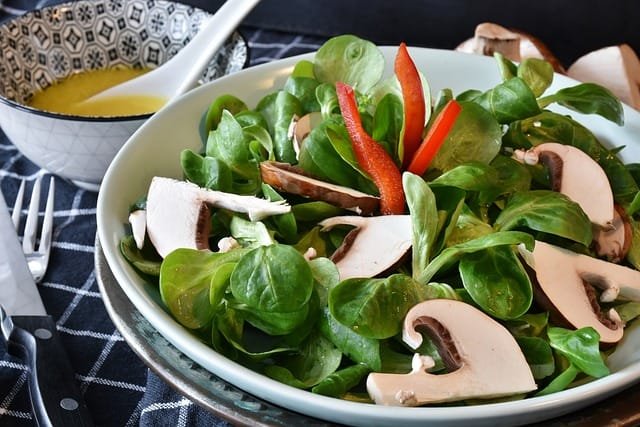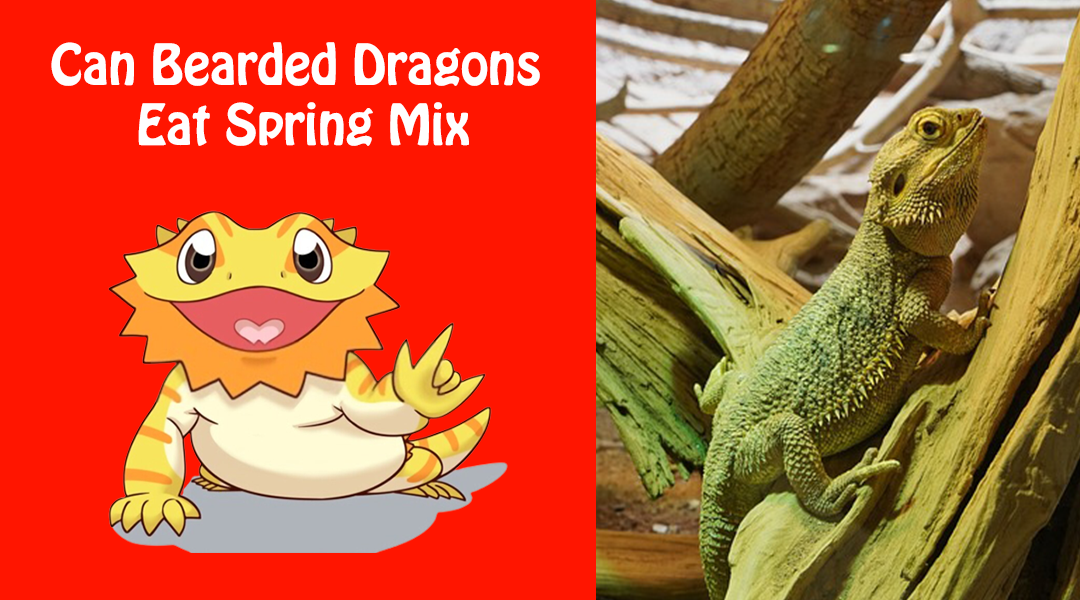Bearded dragons are a popular pet reptile due to their docile nature and ease of care. As omnivores, they can eat a variety of fruits, vegetables, and insects. However, it’s important to know which foods are safe for them to eat. One common question among bearded dragon owners is whether or not they can eat spring mix.
Spring mix is a combination of various lettuces and greens such as spinach, arugula, and radicchio. While these greens are generally considered safe for human consumption, not all are suitable for bearded dragons. Some lettuces, such as iceberg lettuce, have little nutritional value and can even be harmful to bearded dragons due to their high water content and low calcium-to-phosphorus ratio.
In this article, we will explore whether or not bearded dragons can eat spring mix and which specific types of greens are safe for them to consume. By understanding the nutritional needs of bearded dragons and the potential risks of feeding them certain foods, we can ensure that our pets are healthy and happy.

Understanding Bearded Dragons’ Diet
Bearded dragons are omnivores, which means they eat both plants and animals. In the wild, they consume a variety of insects, fruits, vegetables, and flowers. As pets, it is important to provide them with a balanced diet that meets their nutritional needs.
Here are some key points to keep in mind when feeding your bearded dragon:
- Protein: Bearded dragons need protein for growth and to maintain their health. Offer them a variety of insects, such as crickets, mealworms, and dubia roaches. Avoid feeding them wild-caught insects, as they may contain harmful pesticides.
- Vegetables: Bearded dragons need a variety of vegetables to provide them with vitamins and minerals. Offer them dark, leafy greens, such as kale, collard greens, and mustard greens. Carrots, squash, and sweet potatoes are also good options.
- Fruits: Bearded dragons can have fruit as a treat, but it should not make up a large portion of their diet. Offer them small amounts of berries, melons, and citrus fruits.
- Calcium: Bearded dragons need calcium for strong bones and overall health. Dust their food with a calcium supplement, or offer them calcium-rich foods, such as kale and collard greens.
When it comes to spring mix, it is a blend of various lettuces and greens, such as arugula, spinach, and chard. While some of these greens are safe for bearded dragons to eat, others are not. For example, spinach contains high levels of oxalates, which can bind to calcium and prevent its absorption. Arugula and chard are also high in oxalates and should be fed in moderation.
Overall, it is best to avoid feeding your bearded dragon spring mix. Stick to offering them a variety of safe greens and vegetables to ensure they are getting the nutrition they need.
Can Bearded Dragons Eat Spring Mix?
We often get asked whether bearded dragons can eat spring mix, and the answer is yes, they can. Spring mix is a combination of different greens and vegetables that are safe for bearded dragons to eat. However, it is important to note that not all types of spring mix are created equal, and some may be more nutritious than others.
When choosing a spring mix for your bearded dragon, it is important to read the ingredients carefully. Some spring mixes may contain ingredients that are harmful to bearded dragons, such as spinach or kale. These ingredients contain high levels of oxalates, which can bind to calcium and prevent it from being absorbed by the body.
We recommend choosing a spring mix that contains a variety of leafy greens, such as arugula, romaine lettuce, and red leaf lettuce. These greens are low in oxalates and high in nutrients that are important for bearded dragon health, such as calcium and vitamin A.
It is also important to wash the spring mix thoroughly before feeding it to your bearded dragon. This will help to remove any pesticides or bacteria that may be present on the greens. You can do this by rinsing the spring mix under running water and patting it dry with a paper towel.
In conclusion, bearded dragons can eat spring mix as part of a balanced diet. When choosing a spring mix, be sure to read the ingredients carefully and choose one that is low in oxalates and high in nutrients. Remember to wash the spring mix thoroughly before feeding it to your bearded dragon.
Nutritional Value of Spring Mix
Spring mix is a popular salad green that is widely available in most grocery stores. It is a combination of different leafy greens, including arugula, spinach, and romaine lettuce. Spring mix is a great addition to a bearded dragon’s diet because it contains a variety of nutrients that are important for their health.
Here are some of the key nutrients found in spring mix:
- Vitamin A: Spring mix is an excellent source of vitamin A, which is essential for maintaining healthy eyes, skin, and immune system.
- Vitamin C: This nutrient is important for growth and development, and it also helps to boost the immune system.
- Calcium: Bearded dragons need calcium to maintain strong bones and teeth, and spring mix is a good source of this mineral.
- Iron: Iron is important for the production of red blood cells, and it is also necessary for healthy muscle function.
In addition to these nutrients, spring mix also contains other vitamins and minerals, including vitamin K, folate, and potassium. It is also low in calories and high in fiber, making it a great choice for bearded dragons who need to maintain a healthy weight.
Overall, spring mix is a nutritious and tasty addition to a bearded dragon’s diet. However, it should be fed in moderation and should not be the sole source of their nutrition. It is important to provide a variety of foods to ensure that your bearded dragon is getting all of the nutrients they need to stay healthy and happy.
How to Feed Spring Mix to Bearded Dragons
When it comes to feeding bearded dragons, it’s important to provide them with a balanced diet that includes a variety of foods. One food that you may be wondering about is spring mix. Can bearded dragons eat spring mix? The answer is yes, but there are a few things to keep in mind.
First, it’s important to choose the right type of spring mix. Look for a mix that includes a variety of greens, such as spinach, kale, and arugula. Avoid mixes that contain lettuce, as it has little nutritional value for bearded dragons.
Before feeding spring mix to your bearded dragon, be sure to rinse it thoroughly to remove any dirt or debris. You can also chop the greens into small pieces to make them easier for your dragon to eat.
When feeding spring mix to your bearded dragon, it’s important to do so in moderation. While it can be a healthy addition to their diet, too much can lead to digestive issues. We recommend feeding spring mix as a treat, rather than a staple food.
Overall, spring mix can be a nutritious addition to your bearded dragon’s diet when fed in moderation and prepared properly. As always, be sure to consult with a veterinarian or reptile expert if you have any concerns about your bearded dragon’s diet.
Potential Risks of Feeding Spring Mix to Bearded Dragons
Feeding spring mix to bearded dragons can be risky due to a few reasons. While spring mix contains some nutrients that are beneficial to bearded dragons, it also contains some compounds that can be harmful to them. Here are some potential risks of feeding spring mix to bearded dragons:
1. High Oxalate Content
Spring mix contains high levels of oxalates, which can bind to calcium and prevent its absorption. This can lead to calcium deficiency in bearded dragons, which can cause metabolic bone disease. Therefore, feeding spring mix to bearded dragons should be done in moderation.
2. Pesticide Residues
Spring mix is often grown using pesticides, and these residues can be harmful to bearded dragons. Pesticides can cause liver damage, neurological problems, and even death in bearded dragons. Therefore, it is important to wash spring mix thoroughly before feeding it to bearded dragons.
3. Risk of Impaction
Spring mix contains a high amount of fiber, which can cause impaction in bearded dragons. Impaction occurs when the digestive tract becomes blocked, and can be fatal if not treated promptly. Therefore, it is important to feed spring mix in small amounts and to ensure that it is finely chopped.
In conclusion, while spring mix can be a nutritious addition to a bearded dragon’s diet, it should be fed in moderation and with caution. Bearded dragons should be monitored for any signs of calcium deficiency, pesticide toxicity, or impaction when feeding spring mix.

Alternatives to Spring Mix for Bearded Dragons
While spring mix is a popular leafy green for humans, it is not the most ideal choice for bearded dragons. Fortunately, there are plenty of alternatives that can provide your pet with the necessary nutrients they need to thrive.
Here are a few options to consider:
Collard Greens
Collard greens are a great alternative to spring mix, as they are high in calcium and vitamin A. They are also low in oxalates, which can interfere with calcium absorption. Collard greens can be served raw or cooked, but it’s important to remove the tough stems before feeding them to your bearded dragon.
Mustard Greens
Like collard greens, mustard greens are high in calcium and vitamin A. They are also low in oxalates, making them a great choice for bearded dragons. Mustard greens can be served raw or cooked, but it’s important to remove the tough stems before feeding them to your pet.
Dandelion Greens
Dandelion greens are another great option for bearded dragons. They are high in calcium, vitamin A, and vitamin C. Dandelion greens can be served raw or cooked, but it’s important to avoid any plants that have been treated with pesticides or other chemicals.
Endive
Endive is a leafy green that is low in oxalates and high in calcium. It also contains vitamin A and vitamin K. Endive can be served raw or cooked, but it’s important to remove the tough stems before feeding it to your bearded dragon.
Escarole
Escarole is another leafy green that is low in oxalates and high in calcium. It also contains vitamin A and vitamin K. Escarole can be served raw or cooked, but it’s important to remove the tough stems before feeding it to your pet.
Overall, there are plenty of alternatives to spring mix that can provide your bearded dragon with the necessary nutrients they need to stay healthy. It’s important to offer a varied diet and to avoid feeding your pet the same thing every day.
Conclusion
Based on our research, we have found that spring mix is safe for bearded dragons to eat in moderation. However, it is important to note that not all types of spring mix are suitable for them.
When choosing spring mix for your bearded dragon, make sure to avoid any blends that contain toxic ingredients such as onions, garlic, and chives. Additionally, it is recommended to choose organic spring mix to avoid any harmful pesticides or chemicals.
While spring mix can provide some nutritional benefits for bearded dragons, it should not be the sole source of their diet. It is important to offer a variety of vegetables, fruits, and insects to ensure that they receive a balanced and nutritious diet.
Overall, spring mix can be a healthy addition to your bearded dragon’s diet when fed in moderation and with caution. As always, consult with a veterinarian or reptile expert for specific dietary recommendations for your pet.

Frequently Asked Questions
What fruits are safe for bearded dragons to eat?
Bearded dragons can eat a variety of fruits, but some are safer and more nutritious than others. Safe fruits for bearded dragons include berries, melons, and mangoes. Citrus fruits, such as oranges and lemons, should be avoided as they can cause digestive issues.
Is bok choy a good food option for bearded dragons?
Bok choy is a safe and healthy food option for bearded dragons. It is high in vitamins and minerals and is a great source of hydration. However, it should be fed in moderation as it contains high levels of oxalates, which can bind to calcium and prevent its absorption.
Can bearded dragons eat lettuce?
Lettuce is not recommended as a staple food for bearded dragons. While it is safe for them to eat, it has very little nutritional value and can cause digestive issues if fed in large amounts. Instead, opt for nutrient-dense greens like collard greens and mustard greens.
Are collard greens a healthy food for bearded dragons?
Collard greens are a great source of nutrition for bearded dragons. They are high in calcium, vitamin A, and fiber, making them an excellent staple food option. However, they should be fed in moderation as they also contain high levels of oxalates.
What are some recommended greens for bearded dragons?
Some recommended greens for bearded dragons include collard greens, mustard greens, dandelion greens, and turnip greens. These greens are all high in calcium, vitamin A, and fiber and are safe for bearded dragons to consume.
Can bearded dragons safely consume kale?
Kale is safe for bearded dragons to consume, but it should be fed in moderation. While it is high in vitamins and minerals, it also contains high levels of oxalates, which can prevent calcium absorption and cause health issues if fed in excess.

I, Mark Antonelli am highly interested in pet care tips. The experiences I gained through university life in animal sciences were also helpful to identify the best tricks for caring for and feeding varying kinds of pets. I know the majority of people love to own a pet. Yet, there is a guilty of owing a Bearded Dragon due to a lack of information about how much friendly and peaceful they are. I thought of filling this gap with detailed writings about this Pogona genus Bearded Dragon. All my team is also giving me great support to fulfil my mission. Hope you will enjoy the journey with us.

